Related Research Articles

The Dutch West India Company or WICDutch pronunciation:[ʋɛstˈɪndisəkɔmpɑˈɲi] was a chartered company of Dutch merchants as well as foreign investors,formally known as GWC. Among its founders were Reynier Pauw,Willem Usselincx (1567–1647) and Jesséde Forest (1576–1624). On 3 June 1621,it was granted a charter for a trade monopoly in the Dutch West Indies by the Republic of the Seven United Netherlands and given jurisdiction over Dutch participation in the Atlantic slave trade,Brazil,the Caribbean,and North America.

The Gouden Griffel is an award given to authors of children's or teenagers' literature in the Netherlands.

A Spanish Fury was a number of violent sackings of cities in the Low Countries or Benelux,mostly by Spanish Habsburg armies,that happened in the years 1572–1579 during the Dutch Revolt. In some cases,the sack did not follow the taking of a city. In others,the sack was ordered,or at least not restrained,by Spanish commanders after the fall of a city.
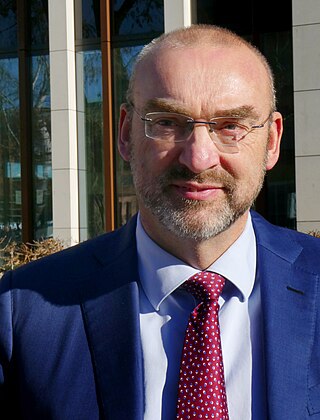
Roelof (Roel) Kuiper is a Dutch historian,philosopher,ideologue,politician and university professor. He was from 2007 to 2019 a member of the Dutch Senate,and is professor of Reformational philosophy at the Erasmus Universiteit Rotterdam in the name of the Association for Reformational philosophy,teaching Society Issues at the Christelijke Hogeschool Ede and Gereformeerde Hogeschool Zwolle and Political and social philosophy at the Vrije Universiteit Amsterdam (VU).
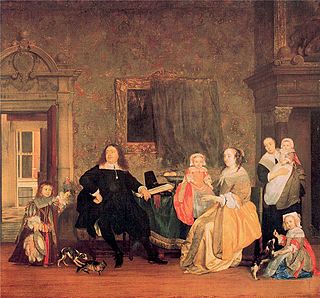
The Portrait of the Family Hinlopen or Family of burgomaster Gillis Valckenier is a painting in the Berlin Gemäldegalerie by the Dutch Golden Age painter Gabriël Metsu of about 1663. There have been various ideas among art historians as to which family is actually represented,with the two main candidates being the families of Jan J. Hinlopen or Gillis Valckenier,both wealthy and powerful figures in Amsterdam at the time.
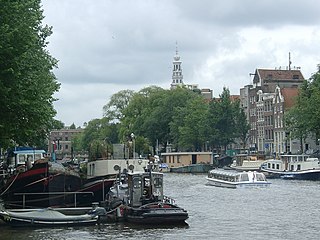
Constanti(j)n Ranst de Jonge was a Dutch businessman employed by the Dutch East India Company (VOC) who was chief of the trading posts in Tonkin and Dutch Bengal and three times opperhoofd of Dejima in Japan.

Arie Theodorus van Deursen was a Dutch historian whose focus was the early modern period. He was Professor Emeritus of History at the Vrije Universiteit in Amsterdam. He was a specialist in Dutch history of the 16th and 17th century.
The Huizinga Lecture is an annual lecture in the Netherlands about a subject in the domains of cultural history or philosophy. The lecture is in honour of Johan Huizinga,a distinguished Dutch historian (1872–1945) who worked in the first half of the 20th century. The Lecture is organized by nationwide daily general newspaper NRC Handelsblad,the Faculty of Humanities of Leiden University,and the Maatschappij der Nederlandse Letterkunde. Attendance at the lecture was free of charge for subscribers to NRC Handelsblad,members of the Faculty of Humanities,and members of the Maatschappij der Nederlandse Letterkunde until 2010. From 2011 onwards tickets have to be bought. The lecture is held alternately by a Dutch and a non-Dutch intellectual.

Camerata Trajectina is a Dutch early music ensemble.
Jacobus Ruurd "Jaap" Bruijn,was a Dutch maritime historian. He was professor of maritime history at the University of Leiden from 1979 until his retirement in 2003. During his 41-year teaching career as The Netherlands' only university professor of maritime history,he guided the doctoral theses of at least 49 graduate students.
Koenraad Wolter Swart (1916–1992) was a Dutch-American historian,best known for his work on the role of William of Orange in the Dutch Revolt,and for his doctoral dissertation on the relationship between the state and state functionaries in the seventeenth century.
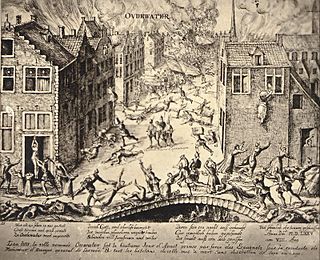
The siege of Oudewater was an event during the Eighty Years' War that took place in the Dutch town of Oudewater,culminating in the Oudewater Massacre. The siege by Spanish troops started on 19 July 1575 and ended on 7 August 1575,when the town was taken by storm and plundered.

Remieg A. M. Aerts is a Dutch historian and Professor of Dutch History at University of Amsterdam.

Gerrit van Santen or Gerard Cornelisz van Santen (1591/92–1656) was a Dutch Golden Age painter and writer. He was born in Delft probably in 1591 or 1592,and was buried in the city on 26 April 1656.

As of 2018,Wolters Kluwer ranks as the Dutch biggest publisher of books in terms of revenue. Other notable Dutch houses include Brill and Elsevier.
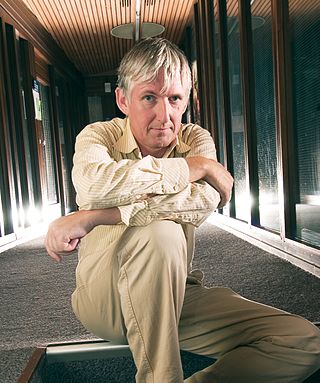
Jan Luiten van Zanden is a Dutch economic historian and professor of Global Economic History at Utrecht University. He is a widely acknowledged specialist in Dutch,European and Global Economic History.

Johan Decavele is a Belgian historian and archivist who worked as head of the Culture Department of the City of Ghent. He has mainly published on the history of Ghent and of the Reformation. He contributed to the Algemene Geschiedenis der Nederlanden,Dictionnaire d'histoire et de géographie ecclésiastiques,Monasticon belge,The Golden Delta of the Low Countries and The Oxford Encyclopedia of the Reformation.
Hans Cools is a historian of early-modern Europe. He is a professor at the KU Leuven and a senior research fellow of the Fryske Akademy.
Eduard Siegfried"Eddy"de Jongh is a Dutch art historian specialized in iconography. He was professor of art history with a teaching assignment in iconography at Utrecht University between 1976 and 1989.
The historiography of the Eighty Years' War examines how the Eighty Years' War has been viewed or interpreted throughout the centuries. Some of the main issues of contention between scholars include the name of the war,the periodisation of the war,the origins or causes of the war and thus its nature,the meaning of its historical documents such as the Act of Abjuration,and the role of its central characters such as Philip II of Spain,William "the Silent" of Orange,Margaret of Parma,the Duke of Alba,the Duke of Parma,Maurice of Orange,and Johan van Oldenbarnevelt. It has been theorised that Protestant Reformation propaganda has given rise to the Spanish Black Legend in order to portray the actions of the Spanish Empire,the Army of Flanders and the Catholic Church in an exaggerated extremely negative light,while other scholars maintain that the atrocities committed by the Spanish military in order to preserve the Habsburg Netherlands for the Empire have historically been portrayed fairly accurately. Controversy also rages about the importance of the war for the emergence of the Dutch Republic as the predecessor of the current Kingdom of the Netherlands and the role of the House of Orange's stadtholders in it,as well as the development of Dutch and Belgian national identities as a result of the split of the Northern and Southern Netherlands.
References
- ↑ Frans Smits (Oct 2001). "De geschiedenis top-20 van 2001". Historisch Nieuwsblad.
- ↑ "Hoe het Maagdenhuis symbool van studentenprotest werd". Reformatorisch Dagblad . 22 May 2019.
- 1 2 "dhr. prof. dr. H.F.K. (Henk) van Nierop". University of Amsterdam. 25 February 2021.
- ↑ "Henk van Nierop". DutchCulture.
- ↑ "Verschuivende contrasten: een interview met Henk van Nierop". Historici.nl. 17 July 2014.
- ↑ Pollmann, Judith; Cools, Hans; Groesen, Michiel van (2014). Het gelijk van de Gouden Eeuw: Recht, onrecht en reputatie in de vroegmoderne Nederlanden. Uitgeverij Verloren. ISBN 9789087044534.
- ↑ Reviewed by J. L. Price in The American Historical Review , 99/5 (December 1994), pp. 1706–1707. doi
.org /10 .1086 /ahr /99 .5 .1706 - ↑ Reviewed by Richard F. J. Paping in The Journal of Economic History , 54/3 (September 1994), pp. 695-696. doi
.org /10 .1017 /S0022050700015126 - ↑ Reviewed by Peter Burke in The Journal of Modern History , 67/2 (June 1995), pp. 471-472.
- ↑ Reviewed by Rudolf Dekker in European History Quarterly , 25/1 (1995), pp. 131–133. doi
.org /10 .1177 /026569149502500107 - ↑ Reviewed by Marybeth Carlson in Journal of Interdisciplinary History , 41/3 (2011), pp. 460-461.
- ↑ Reviewed by Peter Arnade in Renaissance Quarterly , 63/2 (2010), pp. 663-665.
- ↑ Reviewed by Brian G. H. Ditcham in The Sixteenth Century Journal , 42/2 (2011), pp. 600-601.
- ↑ Reviewed by Robert von Friedeburg in The American Historical Review , 116/1 (2011), pp. 234-235.
- ↑ Reviewed by Charles H. Parker in The Journal of Modern History , 83/1 (March 2011), pp. 200-203.